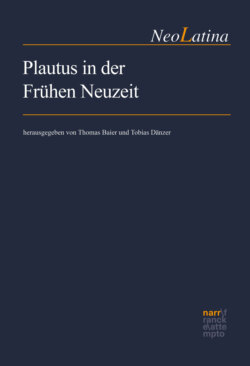Читать книгу Plautus in der Frühen Neuzeit - Группа авторов - Страница 21
1. The title explained; a proposition; the argumentum
ОглавлениеIn 2017 I discovered two letters that shed new light on the transmission of Plautus’ comedies from antiquity to the Early Modern period. One concerns (probably) the “Decurtatus” manuscript and the other concerns the 1552 Basel edition that Joachim CamerariusCamerarius d.Ä., Joachim the Elder based on it.1 To keep the exposition moving, I’ve chosen a fun title inspired by ErasmusErasmus von Rotterdam’Erasmus von Rotterdam Praise of FollyErasmus von RotterdamLaus stultitiae (1509), which he dedicated to Thomas More:
I decided to write a fun essay in praise of folly. “What stroke of genius put that in your head?” you’ll say. Mainly it was your last name, More, which comes as close to the word moria (folly) as you are far from the thing.2
Like ErasmusErasmus von Rotterdam, I hope a little fun will lighten up the serious points I have to make. Consider this proposition:
Quisquis habet Plauti libros cimelia3, peccat:
qui vehit usque sales, iure camelus erit.
It’s natural to think of manuscripts of Plautus’ comedies as cimelia, heirlooms or rare books. But as vectors of sales – salt or jokes – we could also think of them as camels. Analogously, we can think of the scholars who deliver their cargo to us like the traders who have, from time immemorial, traversed the Sahara Desert on camelback to bring slabs of salt from mines to markets. And of all such camelarii, camel drivers, none enjoys greater glory than Joachim CamerariusCamerarius d.Ä., Joachim (1500–1574). As the following argumentum summarizes, I intend to remap the “salt road” he traveled in bringing Plautus’ comedies from antiquity to his own times:
Carvanâ superat Libyae solitudines
Arabs camelorum, insulsis ut portet salem:
Modo qVo caballIs, asInIs DICVntVr ManV4
Exscripti in Latium allati super Alpes libri,
Leone5 duce: is Palatino tractas Lari
Asportat6 spolia, Plauti membranas duas
Relegatque Romam. Dignius CamerariusCamerarius d.Ä., Joachim?
“Insulso cuique relegendo illos aperuit
Veteres vectores (nactus quos fuerat prior7)
Salis, salvomque ad nos DetulIt caMeLarIus.”
